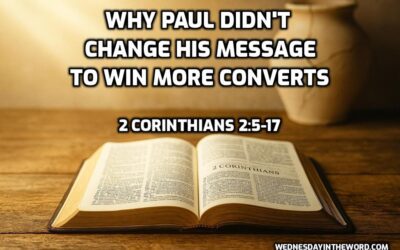Trying harder won’t fix the human heart, and that’s exactly why the new covenant is such good news. In this episode, Krisan Marotta walks us through 2 Corinthians 3:1-6, where Paul defends his ministry by pointing not to his qualifications, but to the life-giving work of the Spirit. Paul’s confidence doesn’t come from his own strength. It comes from what God is doing through him.
03 Why Paul Refused to Change to Win More Converts (2 Corinthians 2:5-17)
Paul’s ministry didn’t look successful. He was often rejected, beaten, and misunderstood. But in 2 Corinthians 2:5–17, Paul reminds us that the gospel doesn’t need to be repackaged to be effective.
02 Why Paul Didn’t Visit Corinth and What That Means for Us (2 Corinthians 1:1-2:4)
When Paul didn’t return to Corinth as expected, some accused him of being unreliable. In 2 Corinthians 1:12–2:4, Paul explains his decision did not result from selfish motives but from pastoral care. His example gives us a window into how mature faith navigates conflict, disappointment, and the hard work of loving others well.
01 Suffering, Comfort & Prayer: What Paul Teaches about Ministry (2 Corinthians 1:1-11)
Suffering Comfort & Prayer in 2 Corinthians: Learn why they matter in the Christian life and what they teach about trusting God.
Founding the Church in Corinth (Acts 18)
Corinth was one of the most influential and morally corrupt cities in the Roman Empire. Yet it became home to a growing church. In this episode, we study Acts 18 to explain how and why Paul founded a church in Corinth, what made Corinth strategic, and how God used unexpected partnerships to advance the gospel.
Easter: Why the resurrection is important
On Easter we celebrate the resurrection of Jesus Christ from the dead. It matters whether something is real or not. It also matters whether an idea is true or not. The historical fact is Jesus rose from the dead, and it makes a difference that he did.
47 How 1 Corinthians Exposes Our Worldliness and Calls Us Back to the Gospel (1 Corinthians 16)
In the business end of the letter, Paul explains his travel plans and gives his final admonitions. We’ll also reflect on two important themes we learned from the letter as a whole.
46 The End of Death: Our Final Transformation (1 Corinthians 15:50-58)
Paul argues that death is a bigger problem than we think because it is more than the end of our earthly life. It is the doorway to judgment. But God will give us mercy in judgment and victory over death because of Jesus Christ.
45 What Will Our Resurrection Bodies Be Like? (1 Corinthians 15:29-49)
Paul answers an objection to the resurrection raised by his opponents with three comparisons: a seed versus the plant it becomes; Adam who brought death versus Christ who brings life; and natural lie now versus transformed life in the kingdom of God.
44 The Goal of History: Christ’s Reign and the End of Death (1 Corinthians 15:20-28)
In correcting the Corinthians’ view that there is no resurrection, Paul argues that resurrection is an essential part of the way God intends to solve the problem of sin and death.
43 Why Christ’s Resurrection Matters (1 Corinthians 15:1-19)
Paul starts correcting the Corinthians view that there is no resurrection from the dead by making two points: 1) Jesus, the man, was resurrected and 2) if Jesus wasn’t resurrected, then his death accomplished nothing and we are still guilty before God.
42 Should Women Keep Silent in Church? (1 Corinthians 14:26-40)
Paul gives the Corinthians a rule for deciding when to speak in their public gatherings: If your speech does not edify the group, keep silent. If your speech does edify the group, take turns in an orderly fashion.












